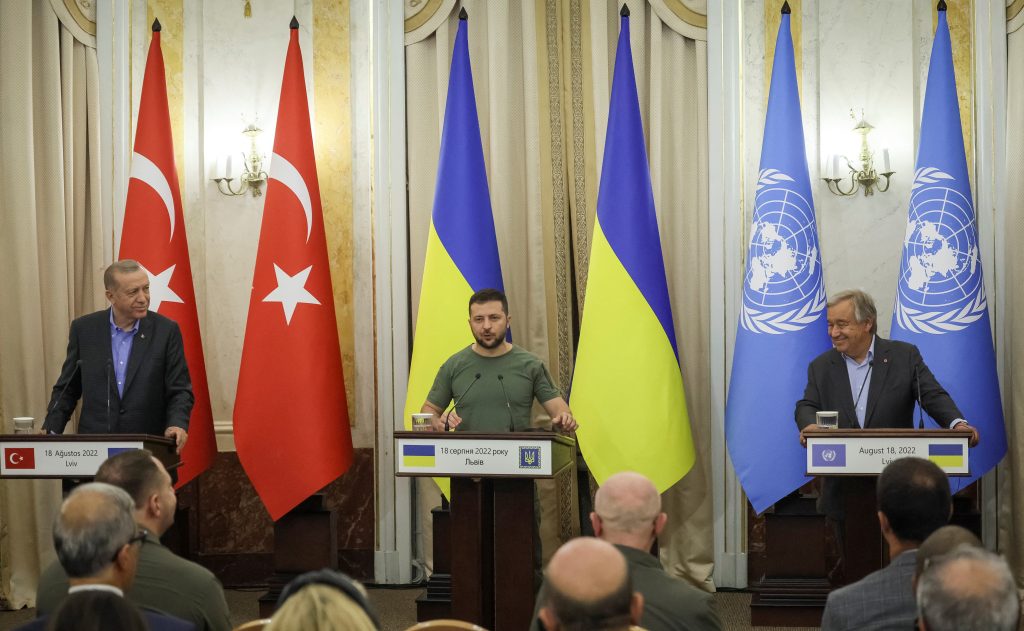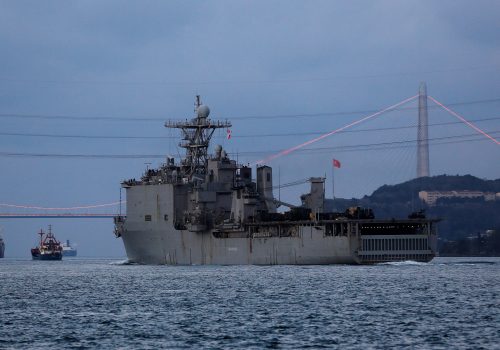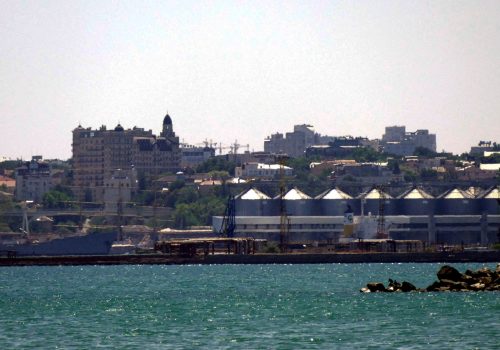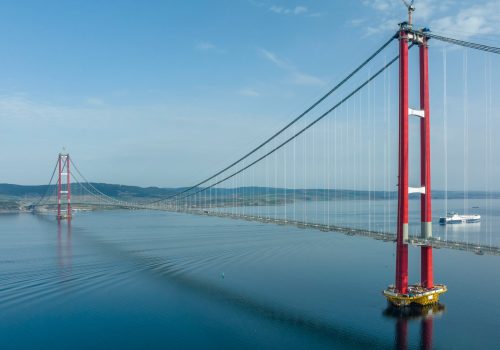During the early days of the Kremlin’s war against Ukraine, Turkey earned well-deserved praise from both Kyiv and its Western allies for supporting Ukrainian sovereignty and territorial integrity, providing armed drones, and closing the Turkish Straits for Russian warships. More recently, its diplomatic efforts to ease the Black Sea grain blockade have also been welcomed.
But as Russia’s invasion has evolved into a genocidal war against civilians, Ankara’s attempt to cast itself as a neutral power broker between the two sides has left many supporters of Turkey in Ukraine deeply disappointed. Ankara’s growing economic ties with Russian companies, Russia’s illegal trade in looted Ukrainian grain via Turkish ports, and Turkey’s alleged facilitation of sanctions evasion for Russian businesses have all fueled claims that Ankara is more interested in salvaging its relationship with Moscow than standing up for Ukraine.
While for Russia the benefits of such cooperation are obvious, it is difficult to say the same for Turkey. In case of further economic and political engagement with Moscow, Ankara could end up even more dependent on Russia—and therefore further estranged from the West.
Now, six months into the war, Russia—amid military losses in Ukraine—may be pushing its partner to talk Ukraine into a ceasefire. At least that seemed to be the motivation behind Turkish President Recep Tayyip Erdogan’s visit to Lviv last month, where he met his Ukrainian counterpart, Volodymyr Zelenskyy, and United Nations Secretary-General Antonio Guterres. Since Russia holds the key to Turkey’s own domestic and economic stability less than a year before Turkish presidential elections, there were few doubts that Vladimir Putin’s increasingly isolated regime would seize this opportunity.
Turkey’s leadership has been keen to capitalize on its previous diplomatic success with the grain deal by presenting that agreement as only the first step toward a permanent peace. Some Turkish officials even suggested that the Joint Coordination Center established in Istanbul could function as a confidence-building measure between Ukrainians and Russians. While this may be music to the ears of Turkish voters—73 percent of whom want their government to remain neutral—calls for peace with Putin’s regime evoke the same feelings in Ukrainians as calls for peace with the Kurdistan Workers’ Party (PKK) terrorist organization would among Turks. Zelenskyy himself perhaps said it best in Lviv: “They can’t actually want peace if they’re bombing our cities and killing our people.”
This is why Turkey’s efforts to push for peace talks will be nothing but counterproductive, at least until basic preconditions are secured. For any meaningful negotiations, Russia needs to be defeated on the battlefield (and in this regard Turkish Bayraktar drones have done more for peace in Ukraine than Ankara’s shuttle diplomacy between Kyiv and Moscow). Until peace is made possible, there is still plenty of space for Ankara to play a constructive role in the conflict to serve both Ukraine’s and its own interests. Here’s how:
- Step up military assistance to Ukraine. Turkey’s arms supplies remain significant for Ukraine’s defensive capabilities. Turkish drones have played an important role in deterring Russian assault, and the recently delivered “Kirpi” mine-resistant ambush-protected vehicles (MRAP) are crucial in maintaining control of terrain. Experts agree that supplying new batches of MRAPs, “Akinci” combat drones, and Turkish multi-launch rocket systems with heavy firepower capabilities (such as the TRG-230 Kaplan and TRG-300 Kasirga) will be of crucial assistance to the Ukrainian military. Additionally, much more could be done to train Ukrainian personnel. After all, Turkish contributions to Kyiv’s military are direct investments into Ankara’s own national and regional security, since Ukraine plays a critical role in deterring not only Russian aggression in the Black Sea but also its power projection to the Mediterranean.
- Secure strict adherence to the Montreux Convention. Turkey has always paid special attention to full compliance with the 1936 convention, which guarantees free movement throughout the Turkish Straits for civilian vessels, and closed the area to Russian warships in the early days of the war to prevent further escalation. But there have been occasional reports of Russia’s violation of the Montreux provisions by using commercial vessels to supply logistics to its military operations in Syria and Ukraine. Most recently, the Turkish ambassador to Ukraine was summoned by the Ukrainian Ministry of Foreign Affairs to answer for the alleged transportation of S-300 missile systems from Syria to Russia via the Bosphorus Strait by a Russian Defense Ministry-chartered ship. Such cases not only undermine Turkey’s image as a country respecting international law but also create dangerous loopholes that can lead to the erosion of the Montreux regime in the future. Ankara must take all necessary measures to thoroughly inspect cargo on the Russian ships passing through the Straits and put an end to any violations.
- Crack down on sanctions evasion. While Turkey hasn’t joined the Western sanctions regime against Russia, it should not allow itself to turn into a hub for Russian efforts to circumvent the measures, especially in sensitive and dual-purpose goods. The US Treasury has already warned Turkey’s largest business group, TUSIAD, and officials that the country will face secondary sanctions if its concerns are grounded in reality. Having $178.6 billion in trade with the European Union, Ankara’s largest trade partner, and only $35 billion with Russia, it is not a moral obligation but simple economic expedience that demands prioritizing economic ties with the West.
- Help expand Ukrainian exports. While the Black Sea Grain Initiative has helped ease the food crisis, it has not fully restored freedom of navigation—which remains a cornerstone of international law (and of Turkey’s own interests in the region). The next tactical aim should be to gradually expand the scope of the grain deal to include other Ukrainian seaports, such as Mykolayiv and Kherson, and to other Ukrainian exports, such as critical raw materials and metals. At the same time, increasing Ukrainian military capacity to put an end to Russian blockades of the Black Sea and the Sea of Azov shall remain a key strategic objective for Ukraine and its allies.
- Cooperate with Ukraine on nuclear safety and security. Russian nuclear blackmailing at the Zaporizhzhia Nuclear Power Plant demands an adequate response. Turkey can play a constructive role in boosting diplomatic efforts to stop Russia’s shelling of the plant and facilitate greater continued access for international monitors. The hands-on experience in safety and security measures will be useful for Turkish specialists once the Russian state nuclear power company Rosatom completes construction of Turkey’s first nuclear power plant, Akkuyu.
- Mediate on humanitarian issues. Turkey should take the lead in facilitating exchanges of Ukrainian prisoners of war and the bodies of deceased soldiers. Here, it already has experience: Ankara successfully facilitated the release to Ukraine of Crimean Tatar political prisoners Akhtem Chiygoz and Ilmi Umerov in 2017. Its diplomatic efforts may be highly sought after as the Kremlin prepares its illegitimate tribunals of captured Ukrainian troops from Mariupol.
- Take part in postwar reconstruction. Following up on its participation in the Ukraine Recovery Conference in Lugano, Switzerland, and the conclusion in Lviv of a memorandum of understanding on rebuilding Ukraine’s damaged or destroyed infrastructure, Turkey should seek a greater role in this process. The Ukrainian Presidential Office said it expects the Turkish government and businesses to develop “special recovery projects” and provide technical and consulting services as part of the deal. While its current financial situation may not allow Turkey to become a major donor to Ukraine’s postwar reconstruction on its own, it could pool its resources with those of the European Bank for Reconstruction and Development and World Bank, which would benefit all sides. By helping Ukraine restore its critical infrastructure, Turkey can boost its own economy in a more transparent way by relying on construction contracts rather than shady Russian money transfers.
- Help ensure regional energy security. More broadly, Turkey should step up its efforts to diversify gas supplies to domestic and European markets. For its part, Europe should strengthen its cooperation with Turkey to increase Azerbaijani gas supplies via the Trans-Anatolian Natural Gas Pipeline and double down on diplomatic efforts to ease tensions in the Eastern Mediterranean. It should also support Turkey’s bid to reduce reliance on fossil fuels from Russia by facilitating international loans for liquefied natural gas imports and the exploration of Turkey’s own Black Sea gas reserves. The Western policy of using sanctions as “a stick” against Ankara has hardly been an efficient way to decrease Turkish dependence on Russian “carrots.”
If there is any silver lining in the war, it is in Turkey’s opportunity to take a stronger stance on Russia and showcase its strategic autonomy—not by questioning the Western resolve to defeat the aggressor, but by taking a lead in the process. Erdogan’s decisive remarks at the Second Crimea Platform Summit denouncing the Russian annexation of Crimea as “illegal and illegitimate” and advocating for the “return of Crimea to Ukraine” show Turkey’s unwavering support to the full de-occupation of Ukraine. But it must follow up with sound policy.
Yevgeniya Gaber is a nonresident senior fellow at the Atlantic Council IN TURKEY and at the Center in Modern Turkish Studies, Carleton University. Follow her on Twitter @GaberYevgeniya.
Further reading
Thu, Sep 1, 2022
To re-engage in the Black Sea, the US must look to Turkey
TURKEYSource By Arnold C. Dupuy
Russia’s invasion of Ukraine presents an opportunity for the United States to re-engage in the Black Sea region. To do so, it will need to work with partners and allies, such as Turkey.
Mon, Jul 25, 2022
Grain drain: Why Turkey can’t afford to ignore Russian grain smuggling from Ukraine
TURKEYSource By Yevgeniya Gaber
The diplomatic goodwill Turkey won in its key role in the deal to unlock Ukrainian grain export is at risk as Russia may prove a spoiler.
Wed, Jun 22, 2022
Turkey’s wartime bridge to the West is collapsing
TURKEYSource By Yevgeniya Gaber
Turkey's balancing act towards Russia's invasion of Ukraine is limiting its goodwill with the West.
Image: Ukrainian President Volodymyr Zelenskiy, Turkish President Tayyip Erdogan and UN Secretary-General Antonio Guterres attend a joint news conference following their meeting in Lviv, Ukraine August 18, 2022. REUTERS/Gleb Garanich



